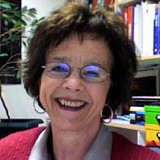Woodrich, Wendy
Open gallery

Wendy Woodrich
Senior Lecturer in Foreign Languages/Spanish Curriculum Director
Years Served: 34
Path to Lewis & Clark:
I had been a student at Lewis & Clark, majoring in Spanish and English. After completing my master’s in Spanish at UNLV, I returned to Oregon to work in social services, using my Spanish as a bilingual newspaper editor with a resource agency for Latinos in Portland, as a counselor for at-risk youth in Washington County, and as an instructor at PCC. When there was a temporary vacancy to teach at L&C, my former professors contacted me to fill in. When the temporary position became long term, I decided to study for my doctorate and teach at L&C at the same time.
Favorite courses to teach:
I’ve enjoyed all of them, from Spanish language classes to advanced literature. I like the variety of teaching language—being able to see students make incredible progress toward proficiency, use their language abilities in real contexts, and gain confidence in the process. I have liked sharing my love not only for the Spanish language, but also for the cultures of Spanish-speaking countries and my experiences traveling and living abroad. And although I love teaching literature courses, especially Latin American literature, I had the most fun during the 14 years I taught my course on Hispanic literature in translation, using Latin American narrative texts from the 20th and 21st centuries. I still have students who tell me years later that García Márquez blew their mind, or that the ending of a Cortázar story still intrigues them. I am grateful for having facilitated that exploration and discovery.
What you’ve enjoyed most about your work:
Since recently returned from another amazing overseas study program, this time in Cuenca, Ecuador, the first that comes to mind is the opportunity to lead seven such programs to Latin America and Spain. I took the first group of students to Costa Rica and Nicaragua—those students are now in their 50s! Three years later, it was Costa Rica and Guatemala. Back then, Central America was a war zone, and we were lucky not only to come through the experience unscathed, but also to get to know personally some of the actors in the conflict. Then it was Argentina, which gave me perspective on the difficult period from which that country was just emerging. My personal experiences and acquaintances from those early programs served as important background for my dissertation, which I was working on at the same time. Later, I led three programs to Seville, Spain—very different from Latin America but wonderful as well. Spain’s art, music, and history are fascinating, and Seville is an important point from which to observe the relationship between Spain and the Americas. And this last program in Ecuador was a wonderful return to Latin America. As in all the previous programs, I enjoyed the close relationships I was able to develop with students as I strove to be a guide and a mentor to them. It’s been a privilege to share my passion for intercultural exploration with several generations of students, and I have loved seeing how the experience has profoundly influenced each of them, whether they have become language teachers, or social workers, or bilingual lawyers, or even Spanish professors. I am grateful to have supported them in what for most has been the most memorable experience of their lives.
Favorite place on campus:
The library.
What you’ll miss:
My wonderful colleagues. The Spanish section—and the foreign languages and literature department—has been my family for 34 years, and many of us go back together into the mists of time. We remember the mimeograph machine, we remember dancing at department parties, we remember the move first from McAfee to Huddleson and then from Huddleson to Miller. We remember the noise of pile drivers as we taught our classes during construction of the new library, we remember teaching in the basement of Copeland. We remember the mission planning process and our training sessions for the oral proficiency interview. We remember the December windstorm during finals week and the old language lab in Throckmorton. There were four years of Mellon grant-funded multimedia projects. We remember generations of language assistants and many department meetings—always cordial. We remember colleagues who have retired or passed away, and we remember interviewing and hiring the fabulous new colleagues who have made our department stronger. I am so grateful for this exceptional relationship.
What you’re most proud of:
That I have made it this far!
What’s next:
Writing, traveling, volunteering, finally getting fluent in French… and many more things I have yet to discover!
Fun fact:
I grew up in Southern Oregon, I dance flamenco (very poorly), and I am allergic to peanuts.
More L&C Magazine Stories
Lewis & Clark Magazine is located in McAfee on the Undergraduate Campus.
MSC: 19
email magazine@lclark.edu
voice 503-768-7970
fax 503-768-7969
The L&C Magazine staff welcomes letters and emails from readers about topics covered in the magazine. Correspondence must include your name and location and may be edited.
Lewis & Clark Magazine
Lewis & Clark
615 S. Palatine Hill Road MSC 19
Portland OR 97219

